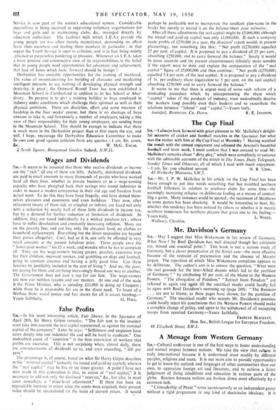False Profits Sta,—In his most interesting article, Fair Shares, in
the Spectator of April 28th, Sir Harry Gilpin remarks: "The fair rent to the investor must take into account the real capital represented, as against the nominal capital of the company." Later he says: "Selfishness and suspicion have eaten deeply into our industrial life and will be hard to eradicate." One undoubted cause of " suspicion " is the firm conviction of workers that profits are excessive. This is not surprising when, almost daily, there are announcements of dividends up to, and even exceeding, " 100 per cent."
The percentage is, of course, based on what Sir Harry Gilpin describes as the " nominal capital " (actually the issued and paid-up capital), whereas the " real capital " may be five or six times greater. A point I have not seen made in this connection is that, to arrive at " real capital," it is necessary to add not only the disclosed "reserves," &c., but also, in most cases nowadays, a " price-level adjustment." If there has been an appreciable increase in prices since the assets were acquired, their present value should be recalculated on the basis of current prices. It would •
perhaps be preferable not to incorporate the resultant plus-value in the books but merely to record it on the balance-sheet pour memoire.
After all these adjustments the real capital might be £5,000,000 although the issued and paid-up capital was only 11,000,000. If such a company made profits of £270,000 in a year, the directors' report would; in present phraseology, run something like this: " Net profit (f270,000) equalled 27 per cent. of capital. It is proposed to pay a dividend of 25 per cent., absorbing £250,000, and to carry forward the balance." Surely it would be more accurate and (in present circumstances) infinitely more sensible if the report were to state and explain the computation of the " real capital " figure of /5,000,000 and then continue: " Net profit (£270,000) equalled 5.4 per cent. of the real capital. It is proposed to pay a dividend of Is. per ordinary share (equivalent to 5 per cent. on the real capital) absorbing £250,000 and to carry forward the balance."
It seems to me that there is urgent need of some such reform of a misleading procedure which, by misrepresenting the share which " capital " takes of the products of industry, must undoubtedly deceive the workers (and possibly even their leaders) and so exacerbate the relations between " labour" and "capital."—Yours truly,










































 Previous page
Previous page